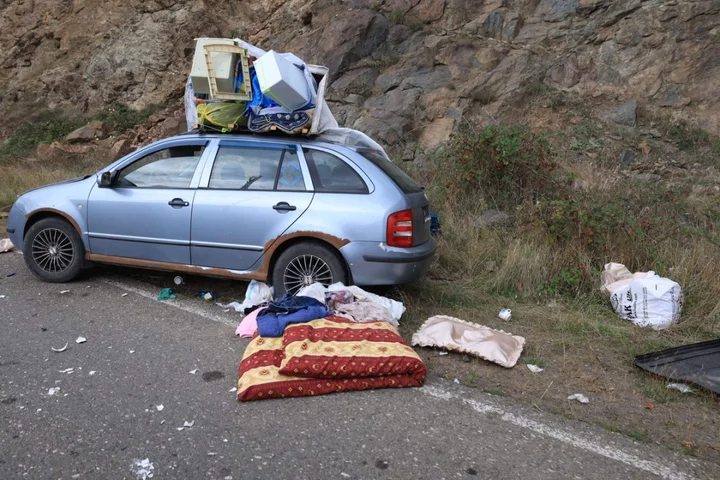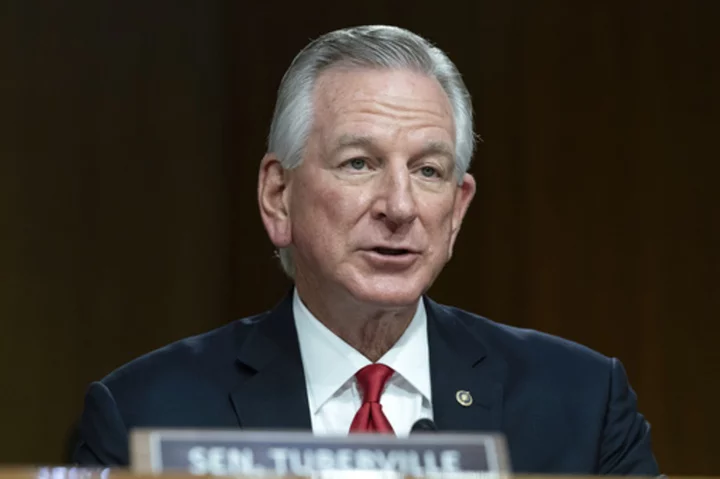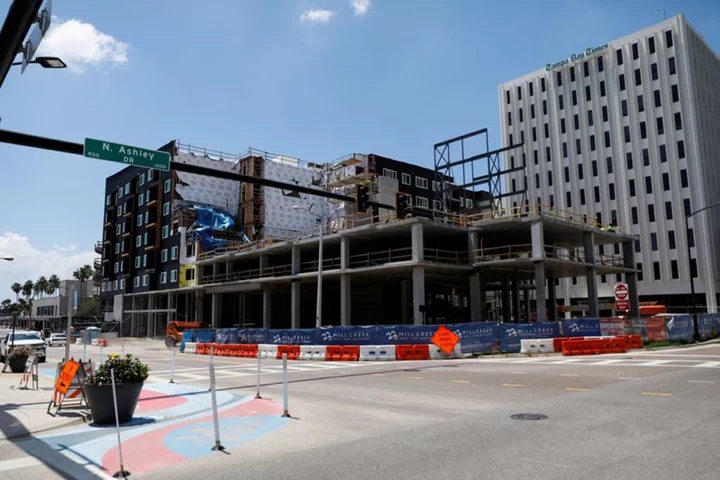Only a few hundred ethnic Armenians, mostly the sick and the elderly, are left in the region of Nagorno-Karabakh, the International Committee of the Red Cross (ICRC) has said, describing “deserted" and "surreal” streets after nearly 80 per cent of the population fled in a few days. Teams of ICRC staffers roamed Karabakh’s main city with megaphones looking for those who remained in the enclave, which has operated for three decades as a de facto Armenian state despite being internationally recognised as being part of Azerbaijan. Last month Baku launched a lightning military operation to take control of the separatist region. More than 100,000 ethnic Armenians have fled to neighbouring Armenia over the last week, fearing reprisals. The most vulnerable are among those who had stayed behind, ICRC team lead Marco Succi said from the Karabakh capital known as Stepanakert by Armenia and Khankendi by Azerbaijan. "The hospitals....are not functioning; the medical personnel left; the water board authorities left; the director of the morgue also left. So this scenario, the scene is quite surreal,” he said. He described finding one bed-ridden cancer patient who had just undergone a colostomy, was on her own and had run out of medication. She was showing signs of malnutrition, despite being left provisions. “Neighbours had left her with food and water several days beforehand, but her supplies were running low. She had finished all her medication and could not take care of herself,” he said. “The neighbours could not take her with them, and while she waited for help, she had started to lose all hope.” Video footage from the main city showed empty streets littered with abandoned prams, suitcases, and children’s toys. In the border regions of Armenia, families who fled told The Independent they fled with whatever they could carry with them. “I just have the clothes I’m standing in,” said Gregory Ayvazyan, 58, a PE teacher who was picking through a pile of donated clothes in Goris. The Armenian authorities, who are struggling to house and support the tens of thousands who are now homeless and jobless, have accused Azerbaijan of instigating "a direct act of ethnic cleansing and depriving people of their motherland." Azerbaijan's Foreign Ministry strongly rejected the accusations, arguing their departure was "their personal and individual decision and has nothing to do with forced relocation." On Tuesday, Armenia's parliament voted to join the International Criminal Court (ICC) which could bring it one step closer to instigating war crimes investigations against Baku. But the move adds further strain to the country's ties with its old ally Russia, which brokered a peace deal between Armenia and Azerbaijan following a war in 2020 and has peacekeeping troops deployed in the region. Armenian officials have argued the move has nothing to do with Russia and was prompted by Azerbaijan's aggression towards the country. Earlier this year the ICC issued an arrest warrant for President Vladimir Putin over events in Ukraine and so Kremlin called Yerevan’s decision to join the court an "unfriendly step”. Kremlin spokesman Dmitry Peskov said Moscow had questions for its current leadership - which will now have to arrest Putin should he visit Armenia, due to an outstanding ICC warrant against him. The exodus of ethnic Armenians closes a centuries-old chapter of history and a thirty-year fight for independence by the majority-Armenian population, which ignited shortly after the collapse of the Soviet Union when a bloody war erupted between Azerbaijan and separatist Armenian fighters, resulting in an Armenian win and the displacement of Azerbaijani citizens. In 2020, Baku launched a military operation to take back the 4,400km enclave, a war in which thousands of people died. Russia brokered a fragile truce, but in December Azerbaijan cut one of the only supply roads and enforced a blockade on Nagorno-Karabakh, strangling food, fuel and water supplies. And then on 19 September, they launched a 24-hour military offensive which forced the outgunned separatists, weakened by the siege, to lay down their weapons and agree to dissolve. Amid reports that Karabakh Armenian officials had been arrested, and fearing reprisals, tens of thousands of Armenians fled to neighbouring Armenia. The United Nations sent its first delegation to Nagorno Karabakh in decades this week and said that only between 50 and 1,000 Armenians were left. In Armenia, Joe Lowry, spokesperson for the UN’s migration agency said “it’s kind of a hidden humanitarian emergency right now because 100,000 people are dispersed all around [Armenia]”. “They are going to face immense strain from, firstly, the goodwill of people that are sheltering them and, secondly, on the national services that are there - healthcare, education, jobs, accommodation.” In Nagorno Karabakh, the ICRC’s Mr Succi said they were trying to bring in essential food to the area and medical supplies to local hospitals which were now unstaffed. He described helping evacuate an 85-year-old lady and her two daughters who cleaned up their house and arranged clothes and food in the fridge as they left. “Despite speaking through tears as she left, she told us: ‘I hope any people coming to live in my house stay well, and never experience war.’ These moments reveal the trials and tribulations of people left behind in the rush,” Mr Succo said. Read More The Body in the Woods | An Independent TV Original Documentary The harrowing discovery at centre of The Independent’s new documentary Armenia's parliament votes to join the International Criminal Court, straining ties with ally Russia Last bus of fleeing Armenians leaves Nagorno-Karabakh: ‘It’s a ghost town’ Armenians describe escape after fall of Nagorno-Karabakh
Only a few hundred ethnic Armenians, mostly the sick and the elderly, are left in the region of Nagorno-Karabakh, the International Committee of the Red Cross (ICRC) has said, describing “deserted" and "surreal” streets after nearly 80 per cent of the population fled in a few days.
Teams of ICRC staffers roamed Karabakh’s main city with megaphones looking for those who remained in the enclave, which has operated for three decades as a de facto Armenian state despite being internationally recognised as being part of Azerbaijan.
Last month Baku launched a lightning military operation to take control of the separatist region. More than 100,000 ethnic Armenians have fled to neighbouring Armenia over the last week, fearing reprisals. The most vulnerable are among those who had stayed behind, ICRC team lead Marco Succi said from the Karabakh capital known as Stepanakert by Armenia and Khankendi by Azerbaijan.
"The hospitals....are not functioning; the medical personnel left; the water board authorities left; the director of the morgue also left. So this scenario, the scene is quite surreal,” he said.
He described finding one bed-ridden cancer patient who had just undergone a colostomy, was on her own and had run out of medication. She was showing signs of malnutrition, despite being left provisions.
“Neighbours had left her with food and water several days beforehand, but her supplies were running low. She had finished all her medication and could not take care of herself,” he said. “The neighbours could not take her with them, and while she waited for help, she had started to lose all hope.”
Video footage from the main city showed empty streets littered with abandoned prams, suitcases, and children’s toys. In the border regions of Armenia, families who fled told The Independent they fled with whatever they could carry with them.
“I just have the clothes I’m standing in,” said Gregory Ayvazyan, 58, a PE teacher who was picking through a pile of donated clothes in Goris.
The Armenian authorities, who are struggling to house and support the tens of thousands who are now homeless and jobless, have accused Azerbaijan of instigating "a direct act of ethnic cleansing and depriving people of their motherland."
Azerbaijan's Foreign Ministry strongly rejected the accusations, arguing their departure was "their personal and individual decision and has nothing to do with forced relocation."
On Tuesday, Armenia's parliament voted to join the International Criminal Court (ICC) which could bring it one step closer to instigating war crimes investigations against Baku.
But the move adds further strain to the country's ties with its old ally Russia, which brokered a peace deal between Armenia and Azerbaijan following a war in 2020 and has peacekeeping troops deployed in the region.
Armenian officials have argued the move has nothing to do with Russia and was prompted by Azerbaijan's aggression towards the country.
Earlier this year the ICC issued an arrest warrant for President Vladimir Putin over events in Ukraine and so Kremlin called Yerevan’s decision to join the court an "unfriendly step”.
Kremlin spokesman Dmitry Peskov said Moscow had questions for its current leadership - which will now have to arrest Putin should he visit Armenia, due to an outstanding ICC warrant against him.
The exodus of ethnic Armenians closes a centuries-old chapter of history and a thirty-year fight for independence by the majority-Armenian population, which ignited shortly after the collapse of the Soviet Union when a bloody war erupted between Azerbaijan and separatist Armenian fighters, resulting in an Armenian win and the displacement of Azerbaijani citizens.
In 2020, Baku launched a military operation to take back the 4,400km enclave, a war in which thousands of people died. Russia brokered a fragile truce, but in December Azerbaijan cut one of the only supply roads and enforced a blockade on Nagorno-Karabakh, strangling food, fuel and water supplies.
And then on 19 September, they launched a 24-hour military offensive which forced the outgunned separatists, weakened by the siege, to lay down their weapons and agree to dissolve.
Amid reports that Karabakh Armenian officials had been arrested, and fearing reprisals, tens of thousands of Armenians fled to neighbouring Armenia.
The United Nations sent its first delegation to Nagorno Karabakh in decades this week and said that only between 50 and 1,000 Armenians were left. In Armenia, Joe Lowry, spokesperson for the UN’s migration agency said “it’s kind of a hidden humanitarian emergency right now because 100,000 people are dispersed all around [Armenia]”.
“They are going to face immense strain from, firstly, the goodwill of people that are sheltering them and, secondly, on the national services that are there - healthcare, education, jobs, accommodation.”
In Nagorno Karabakh, the ICRC’s Mr Succi said they were trying to bring in essential food to the area and medical supplies to local hospitals which were now unstaffed.
He described helping evacuate an 85-year-old lady and her two daughters who cleaned up their house and arranged clothes and food in the fridge as they left.
“Despite speaking through tears as she left, she told us: ‘I hope any people coming to live in my house stay well, and never experience war.’ These moments reveal the trials and tribulations of people left behind in the rush,” Mr Succo said.
Read More
The Body in the Woods | An Independent TV Original Documentary
The harrowing discovery at centre of The Independent’s new documentary
Armenia's parliament votes to join the International Criminal Court, straining ties with ally Russia
Last bus of fleeing Armenians leaves Nagorno-Karabakh: ‘It’s a ghost town’
Armenians describe escape after fall of Nagorno-Karabakh









